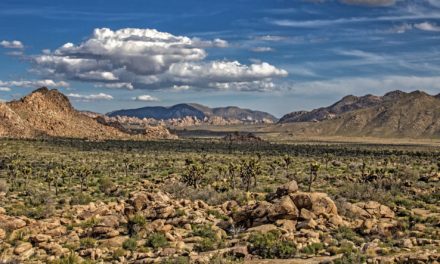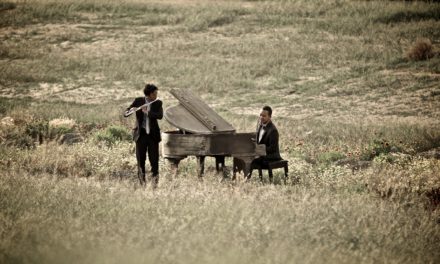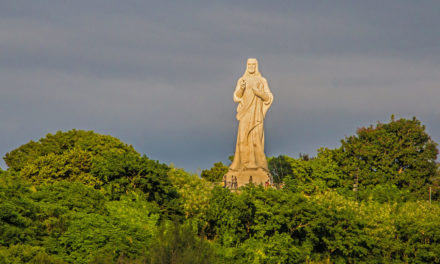“But will God indeed dwell on the earth? Even heaven and the highest heaven cannot contain you, much less this house that I have built! Regard your servant’s prayer and his plea, O Lord my God, heeding the cry and the prayer that your servant prays to you today; that your eyes may be open night and day toward this house, the place of which you said, ‘My name shall be there,’ that you may heed the prayer that your servant prays toward this place. Hear the plea of your servant and of your people Israel when they pray toward this place; O hear in heaven your dwelling place; heed and forgive…“If there is famine in the land, if there is plague, blight, mildew, locust, or caterpillar; if their enemy besieges them in any of their cities; whatever plague, whatever sickness there is; whatever prayer, whatever plea there is from any individual or from all your people Israel, all knowing the afflictions of their own hearts so that they stretch out their hands toward this house; then hear in heaven your dwelling place, forgive, act, and render to all whose hearts you know—according to all their ways, for only you know what is in every human heart—so that they may fear you all the days that they live in the land that you gave to our ancestors.
~ 1 Kings 8: 27-30; 37-40
Exegetical Reflection
Our text is found in the series of Solomon’s prayers of petition embedded in the report of his temple dedication ceremony.
Ironically, it is in this dedication ritual that the newly built temple appears to be “demythologized.” God does not dwell on the earth. Not even the highest heaven, much less the temple, can contain Her. Only God’s “Name shall be there.”
What’s in the Name? Is it some kind of consubstantial hypostasis still filling the temple with Divine substance? Or has the concrete, material Divine presence in the temple as described elsewhere in the Hebrew Bible (Exod. 40, etc.) given way to presence in absentia, to abstract, non-substantial, merely representative presence? If so, what brought this transition about?
Answering this question would require examining the historical questions of who wrote and edited the text, when, for whom, reflecting whose views under what historical circumstances. Even a look at ancient parallels in the neighboring cultures would be in order. All of which is somewhat beyond the scope of this piece, so I will set aside this question for now.
That leaves us to read the text as it stands without the question of compositional, redactional, or comparative history. In that case, this prayer is elevated to a standardized level covering all-time contingencies with at least one picture clearly emerging. In the prayer, Solomon—even in the apex of his rule, even at a moment when arrogance could not be readily criticized, even then—he anticipates plague among the “elect.” No jingoistic, “patriotic” exceptionalism on this account.
I stretch out my hands to the Name, wherever it may dwell. I confess that I do not fully comprehend what is in the Name. But I do believe that it is the Name that has substantively identified with the most vulnerable throughout the ages, from the Good Samaritan’s patient to those who have the least protection against COVID19 and its socioeconomic impact.
Even in COVID19 exile, I stretch out my hands over my keyboard searching for the “Petition” buttons and links to support authentic politics and politicians. I do this in the spirit of Abraham Heschel’s confession regarding his march with MLK, Jr., “I felt my legs were praying.” And there’s nothing non-concrete, non-material, non-substantial, abstract, or in absentia about that.
The temple may be in need of remythologizing toward the materiality of Divine presence.
So, where is that temple?
—Wonil Kim
Descriptive-Theological Reflection
During this global pandemic, I turn to the wisdom of communities whose lives have been under threat for millennia. To live threatened by resurrection is living prayerfully, carrying the many names of those who have died, are dying and those living under the threat of death. Writing during a 30 year civil war when the government of Guatemala committed acts of genocide against the Maya population, poet and theologian Julia Esquival pens the poem “They Have Threatened Us with Resurrection.” She writes:
…There is something here within us
Which doesn’t let us sleep, which doesn’t let us rest,
Which doesn’t stop pounding deep inside,
It is the silent, warm weeping of Indian women without their husbands,
It is the sad gaze of the children
Fixed there beyond memory,
In the very pupil of our eyes
Which during sleep, though closed, keep watch
With each contraction of the heart
In every wakening…
What keeps us from sleeping,
Is that they have threatened us with resurrection!
Because at each nightfall,
Though exhausted from the endless inventory
Of killings since 1954,
Yet we continue to love life,
And do not accept their death!
…Because in this marathon of Hope,
there are always others to relieve us
in bearing the courage necessary
to arrive at the goal which lies beyond death…
Accompany us then on this vigil
And you will know what it is to dream!
You will then know how marvelous it is
To live threatened with resurrection!
To dream awake,
To keep watch asleep
To live while dying
And to already know oneself resurrected!
I carry the Names of the ancestors and their courageous acts that have always carried and sustained me. We have collectively lived through numerous atrocities. I have come to know the presence of those who are absent more intimately through my experience as a parent of a toddler with a chronic illness. Xin Xin, my daughter, has beta thalassemia major and requires blood transfusions every three weeks to sustain life. The majority of blood in her body is blood given to her by many unnamed Names. The life is in the blood given to her through regular donation. I witness resurrection every three weeks as I sit by her bed and watch the blood of others enter her body. Xin Xin’s body is the temple that houses the prayers of unseen others.
—Marlene Ferreras
Systematic-Theological Reflection
A scene from the movie Shadowlands depicts what modern humans expect from prayer rituals. Anthony Hopkins (who plays the character C.S. Lewis) clashes with Michael Denison (who plays the character Harry). Harry thinks he is reassuring Lewis in his devotional practice of prayer when he says:
Harry: “Christopher can scoff, but I know how hard you’ve been praying. And now God is answering your prayer.”
Lewis: “That’s not why I pray, Harry. I pray because I can’t help myself. I pray because I’m helpless. I pray because the need flows out of me all the time, waking and sleeping. It doesn’t change God. It changes me.”
The sentiment (that prayer doesn’t change God, it changes me) implies a non-answer to the question “is prayer a dialogue or a monologue”?
In times of crisis, a non-answer becomes the default answer. Our prayers may, in the end, prove to be monologues. So we hedge our bets. We stop petitioning with bold imperatives. We expect no answers. We opt, instead, to measure the “beneficial” psychological effects of prayer. Now we no longer need to question 1) if our faith is weak, or 2) if our words are amateur, or worse yet 3) if no Cosmic Ear is present to hear and answer. In the end, prayer as a monologue leaves us to stand, kneel or lay prostrate (in an empty space) like the Pharisee who prayed by himself (Luke 18: 11).
But the Christian doctrine of God safeguards our prayer rituals from becoming internal, self-referential, therapeutic reflexes. What is prayer without terms like “hear,” “forgive,” “act,” “render,”? And what sense would those terms make without a presence? The aim of prayer stretches out beyond human therapies that we invent to “change” us. To say “it’s in God’s hands,” does not simply translate “I have done all that I can do.” It expresses our trust that God hears us. Not that we give God information not previously known. Prayer symbolizes our conviction that God is not inattentive: it reflects our faith that what is most real in our world is a Cosmic Presence.
Jesus, who taught us to pray, said when you pray say “give,” “forgive,” “lead us not,” “deliver us.” Scripture records that “Jesus offered up prayers and supplications, with loud cries and tears, to the one who was able to save him from death, and he was heard…” (Hebrews 5:7). We believe he was heard because his story did not end on the Cross. He prayed. His Father heard. Death was conquered. Christ ever lives. “God is spirit” (John 4:24). The doctrine of God calls us to believe that whatever reality there is, it ultimately involves a Cosmic Universal Will: a will that connects with our spirits and “with sighs too deep for words” (Romans 8:26) intercedes and saves.
—Maury Jackson
Pastoral Reflection
It’s hard not to go to the physical space (the house, the holy ground) where we’ve gathered to experience God’s presence together in the past. So hard, in fact, that some pastors have insisted on holding in-person services, defying public health directives, even mounting legal cases in various states across the country.
This misses the point. Yes, it’s comforting to be in the space, or even to see familiar faces in the sanctuary via pre-recorded, social-distanced streaming. But even Solomon recognizes that God cannot be contained in the highest heaven, never-mind the house Solomon has built. It’s God’s Name that is there.
God’s people can connect to that Name by simply stretching out their hands. Today, we stretch out our hands using tools like Facebook (to interact with those watching Sabbath’s message streamed from the sanctuary), Zoom (to see people we love, whether at an online Sabbath School, a kid’s birthday party, or a committee meeting), FaceTime (so our parents can see their grandkids, including the one born three weeks ago), and apps like Marco Polo (to watch greetings left by friends). We text and call, checking in on people we probably wouldn’t have, in an alternate reality.
The point is not the “where” or the “how,” but the “why” and the “who.” Matthew remembered Jesus saying it this way. “For where two or three are gathered together in my name, I am there in the midst of them” (Matthew 18:20). It may look different right now, and feel awkward for many of us, but we continue to gather, stretching our hands up and out. As we do, may we experience God’s presence, together, in, surprisingly healing, new ways.
—Raewyn Orlich
May you never lose sight of God’s grace and love!
Be well!
HMS Richards Divinity School




